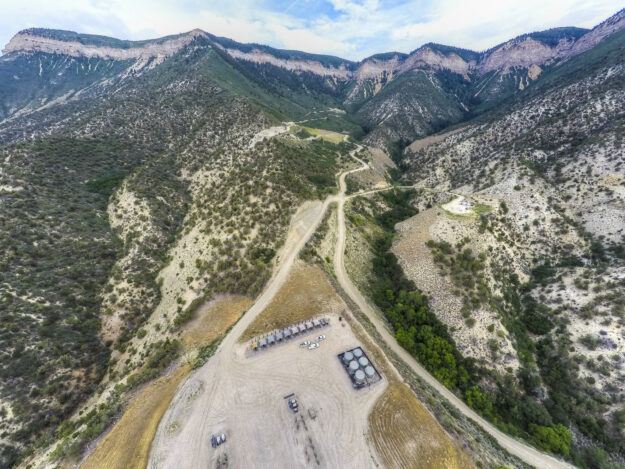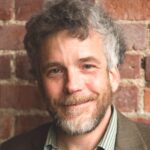Widgetized Section
Go to Admin » Appearance » Widgets » and move Gabfire Widget: Social into that MastheadOverlay zone
Opinion: Frisch flat wrong about fossil fuel extraction on Colorado public lands

A view of oil and gas development on Bureau of Land Management lands in Colorado, on Jan. 3, 2015 (Bob Wick/BLM/Public domain).
Adam Frisch — candidate for Colorado’s sweeping 3rd Congressional District — is wrong. Despite all evidence showing otherwise, his position seems to be that fracking more of Colorado’s public lands to export more U.S. gas abroad is good for addressing climate change and the environment.
It’s not.
Fracked methane gas is rapidly heating our region and planet, which is at or breaching tipping points, and its continued development is contributing to other deep ecological harms like the biodiversity crisis. This puts economic, other social, and many vital natural systems in peril.
For the first time since record-keeping began, the Earth has surpassed 1.5 degrees Celsius of heating above pre-industrial levels, a threshold almost all the world’s nations’ pledged, just a decade ago, to avoid. The Colorado River Basin is already in crisis, facing persistent, long-term drought with western Colorado irrigators wondering if their water is next.

The willingness to allow this, and even to embrace it as a political choice, discounts our own time and puts our children’s future on the rack for fire-sale prices. More fossil fuel development in western Colorado means fracking places that communities care about and that we rely on for other needs. There is no place to develop fossil fuels that removes these impacts or eliminates this harm. Continued oil and gas development jeopardizes our shrinking water supply directly from contamination, through further depletion for industrial use, and by heating our region more quickly than even our rapidly warming planet.
There are many other qualities that public lands offer to boost our well-being and economies. New industrial operations and a sprawling infrastructure of roads and pipelines, compressor stations and processing plants, could instead occupy these places and degrade other values. Pollution and impacts to climate, air, water, wildlife and humans spread much further.
Colorado’s fracked gas is primarily not for Colorado. But Democratic candidate Frisch sounds eager to export more, especially overseas, despite U.S. exports already being at or near all time highs. What I hear, and maybe others like me, is someone arguing that we should drill Colorado’s prized public and wildlife lands to ship more climate-harming methane and U.S. energy abroad. For western Colorado, this likely also means new pipelines and the government using eminent domain to force right-of-way across farms and ranches. Many experts claim that more exports raise U.S. consumer prices even if it is a boon to frackers and exporters.
As the Fifth National Assessment on the climate crisis and the Intergovernmental Panel on Climate Change synthesis report, both from 2023, make clear that the path to a livable climate lies beyond fossil fuels. The International Energy Agency also recently published its updated guide to net-zero with the same conclusion: The development of additional oil and gas is rapidly foreclosing on our ability to take meaningful climate action.
The bottom line is that each moment of delay and every political hedge is costing lives and fortunes. To be the leader western Colorado needs, a candidate should speak to taking the Western Slope to where we have to get to, not be a bulwark to what we must leave behind.
Frisch could start by more clearly articulating his vision for Colorado’s public lands and how he will help address the climate crisis head on. How will we work together to ensure a more resilient Southwest? What actions can we take to secure our watersheds and future?
As a voter I need to know how my member of Congress will protect the environmental, habitat and human benefits that intact, non-industrialized public lands provide. I choose to live in western Colorado and that is a top reason that I am a climate- and conservation-informed voter. This is also true of very many voters across the district and state.
And like the majority of voters in the 3rd District, I am among the unaffiliated. I need reasons to support a candidate beyond which jersey they wear. Perhaps I am old-fashioned, conservative even, in that regard. But it is a republic. I want to keep it by being represented in it.
Despite the severe climate jeopardy that western Colorado is in, where I live, with threats from drought, wildfire and infrastructure damage now a clear and ever-present danger, I worry that Frisch has not shown himself to be a climate-focused or a strong conservation candidate. I hope that I am the one who is wrong. I am eager to hear a case otherwise.
So far I have not.
Editor’s note 1: Pete Kolbenschlag has spent over 25 years advocating for Colorado’s public lands, wildlife, waters and climate, as a conservation-informed voter based in rural Delta County.
Editor’s note 2: This opinion column first appeared on Colorado Newsline, which is part of States Newsroom, a nonprofit news network supported by grants and a coalition of donors as a 501c(3) public charity. Colorado Newsline maintains editorial independence. Contact Editor Quentin Young for questions: info@coloradonewsline.com. Follow Colorado Newsline on Facebook and Twitter.


